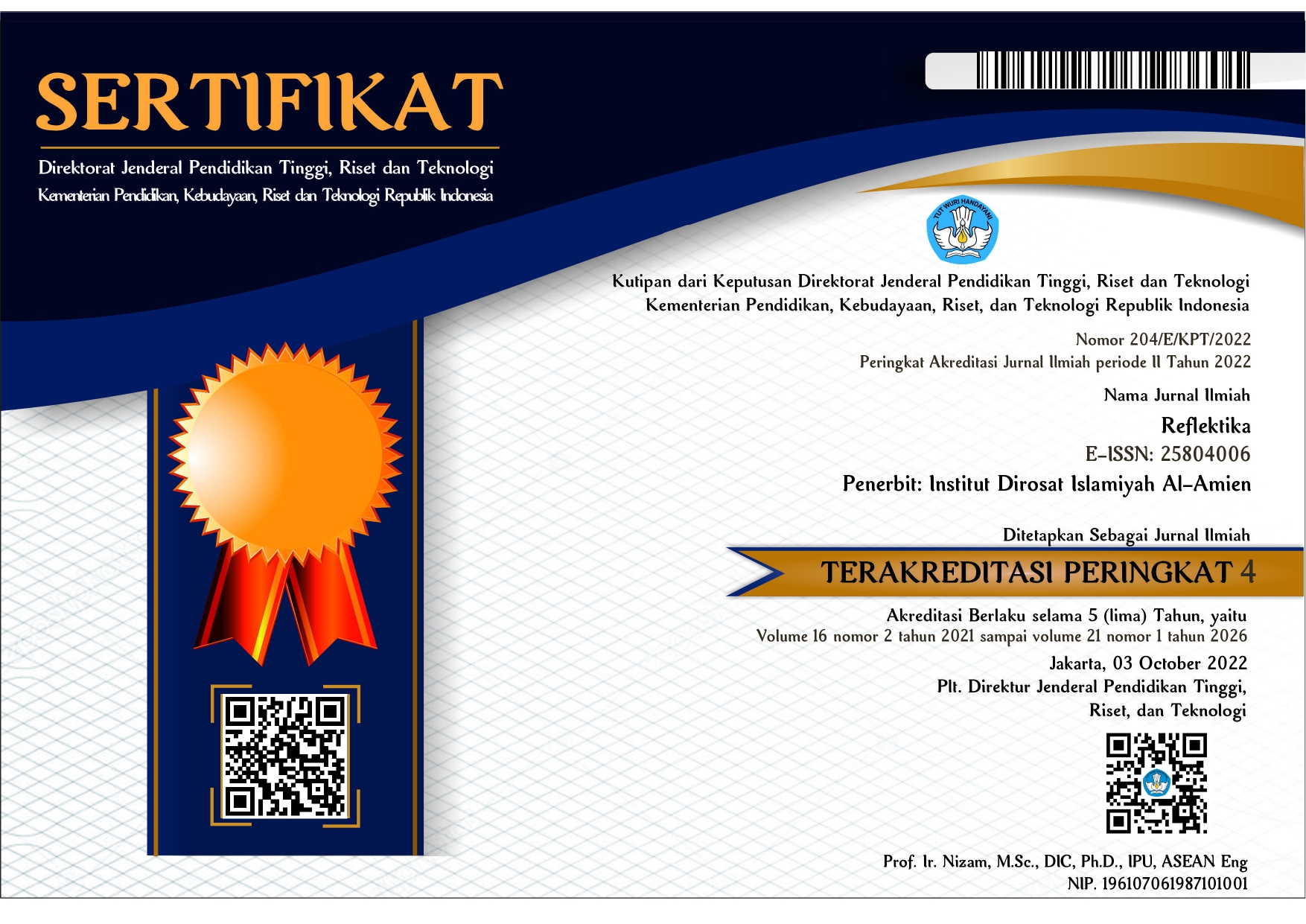NILAI PENDIDIKAN ISLAM DALAM KITAB AQIDATUL AWWAM DAN IMPIKASINYA DI ERA DISTRUPSI
Abstract
Because of the proliferation of do-it-yourself internet and technology during the disruptive era, Muslims now have to exercise more discerning judgement when deciding what information and digital da'wah to accept online. Muslims have a challenge in this area since they are urged to exercise more discernment in their consumption of the vast amounts of digital information and propaganda available today. Two issues arose as a result of this investigation's findings: 1. Sayyid Ahmad Al-Marzuky, in his book Aqidatul Layman, explains why learning about aqidah is important; 2. Implications for today's society of the values espoused in aqidah education, as stated by Sayyid Ahmad Al-Marzuky in his book Aqidatul Awwam, in light of the prevailing disarray. This kind of research is often done at a library. The Book of Aqidatul Awwam, translated and published by "Al-Miftah" in Surabaya; secondary sources employing a semiotic approach; data collection techniques involving reduction, heuristics, and hermeunitics; documentation; and, finally, the use of contingent analysis to interpret the results. The study's goals led to the following results: 1) Sayyid Ahmad Al-Marzuki's Book of Aqidatul Awwam is divided into six sections, which are as follows: a. Belief in Allah, which necessitates acceptance of the attributes attributed to Him; b. Have confidence in Rasulullah; c. Angel Trust; d. Faith in Allah's scriptures; e. Faith in the Last Day; f. Confidence in one's own future. 2) There are reportedly three types of Implications of the Values of Aqidah Education found in the Book of Aqidatul Layman in the Disruptive Era. Here are the three classes: a. Muslims are barred from worshipping anything or anybody save Allah; b. To safeguard oneself against the influence of false religious teachings that may emerge as a byproduct of advances in technology; c. Promote the spread of Islam.
Â
Â
Keywords
References
Abdullah bin ‘Abdil Hamid al-Atsari. Panduan Aqidah Lengkap. Bogor: Bogor: Pustaka Ibnu Katsir, 2015.
Achmad, Sunarto. Ilmu Tauhid Tingkat Dasar. Surabaya: Surabaya: Al-Mifta, 2016.
Al-jumri, Muh.Asroruddin. Belajar Aqidah Akhlak. Yogyakarta: Yogyakarta: Deepublish, 2015.
Al-Marzuky, Ahmad. Kitab ’Aqidatul Awam . Rembang: Rembang: Menara Kudus, 2015.
Bagir, Z.A. Intergrasi Ilmu Dan Agama. Bandung: Bandung: Mizan, 2015.
Berawi, Muliawati. “Etika Dakwah Pada Masyarakat Global.†Bina’ Al-Ummah 14, no. 1 (2019): 39–58.
Darajat, Zakiyah. Ilmu Pendidikan Islam. Jakarta: Jakarta: Bumi Aksara, 2014.
Jawas, Yazid bin Abdul Qadir. Syarah Aqidah Ahlus Sunnah Wal Jama‟ah. Jakarta: Jakarta: Pustaka Imam Asy-Syafi’i, 2016.
Karim, Pangulu abdul. “Fungsi Aqidah Dan Sebab-Sebab Penyimpangan Dalam Aqidah.†Jurnal Tarbiyah 7, no. 1 (2016).
Kasali, Renald. Disruption. Jakarta: Jakarta: Gramedia Pustaka Utama, 2017.
Maslikhah. Insklopedia Pendidikan. Salatiga: Salatiga: Stain Salatiga Press, 2015.
Mestika, Zed. Metode Penelitian Kepustakaan. Cet. ke-1. Jakarta: Jakarta: Yayasan Obor Indonesia, 2014.
Naufa, Murtadho. Konsep Pendidikan Aqidah Perspektif Syaikh Shalilh Fauzan. Lampung: Lampung: Brama Sari, 2017.
Sari, Milya, and Asmendri. “Penelitian Kepustakaan (Library Research) Dalam Penelitian Pendidikan IPA.†Jurnal Penelitian Bidang IPA Dan Pendidikan IPA 6, no. 1 (2010): 13.
Setiawan, Dyfa Dwiputra. “Pengaruh Mindset Pendidikan Di Era Disrupsi Dan Latar Belakang Pendidikan Orang Tua Terhadap Motivasi Belajar Siswa Di SMA Islam Terpadu Adzkia Sukabumi.†Fakultas Agama Islam. Universitas Islam Indonesia, 2010.
DOI: 10.28944/reflektika.v14i2.1230
Refbacks
- There are currently no refbacks.


.png)

